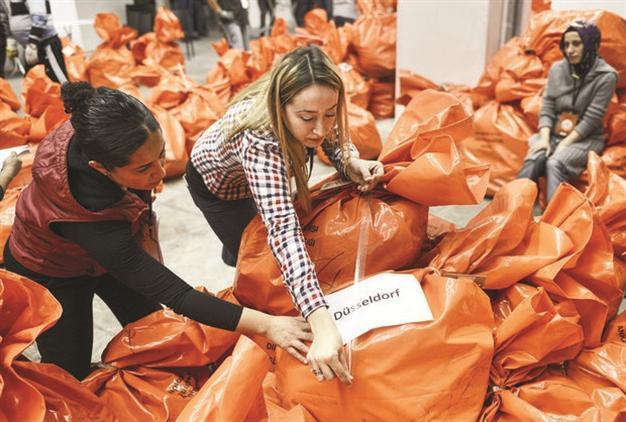Increase in voter turnout expected in Turkey’s Nov 1 snap elections
Rifat Başaran - ANKARA

AA photo
Turkey’s voters are expected to head to polling stations on Nov. 1 in even greater numbers than the June 7 elections in a development that could be advantageous for all parties, according to survey companies.
Özer Sencar, the chairman of the pollster Metropoll, said they expected the turnout to be between 84 and 86 percent, while underlining that the choices of around 2 million university students would play a decisive role after Oct. 30, the day after Republic Day, which is an official holiday, was also declared an administrative holiday by the government. The selection of Nov. 1 as a poll day raised question marks as to whether some civil servants and university students living in cities other than their hometowns might plan to extend their one-day official Republic Day holiday to head home to vote.
Sencar also anticipated that some Kurdish voters living in eastern and southeastern Anatolia might not cast their votes either because they were forced to leave their hometowns due to the ongoing conflict between security forces and the outlawed Kurdistan Workers’ Party (PKK) or because of an environment of pressure.
According to the latest survey by Metropoll, 85.8 percent of voters are expected to cast ballots on Nov. 1.
Tarhan Erdem, the founder of the KONDA research company, agreed that the voter turnout would increase in the critical election.
“All sides have been feeling ambitious, with both the ruling party and the opposition parties struggling to win. The share of votes by all parties will be preserved,” Erdem said.
Bekir Ağırdır, general manager of KONDA, said they expected a 91 percent turnout, confirming that the increase in the turnout would have an equal impact on the share of parties.
ComparisonThe results of the least four elections held in Turkey display a gradual increase in voter turnout. According to figures by the Supreme Election Board (YSK), 32,768,161 of 41,407,027 eligible voters cast their votes in the Nov. 3, 2002, parliamentary elections. The turnout was 79.14 percent with 31,528,378 valid votes.
In the July 22, 2007, parliamentary elections, 36,056,293 of 42,799,303 eligible voters cast their votes. The figure represented a turnout of 84 percent with 35,049,691 valid votes.
In the June 12, 2011, parliamentary elections, 43,914,763 of 52,806,322 eligible voters cast their votes. The turnout was 83.16 percent with 42,941,763 valid votes.
As for the June 7 elections, 47,507,467 of 56,608,817 eligible voters cast their votes, good for a turnout of 83.92 percent with 46,163,243 valid votes.
Nonetheless, there was a crucial difference in the June 7 elections as expat voters were able to cast their votes in a parliamentary election at polling stations placed in diplomatic locations around the world, not just at customs gates. When expat votes are ignored, the turnout was 86.43 percent, as only 32.5 percent of eligible expat voters cast their votes in the June 7 election. The number of new eligible voters reached over 1,270,000 for the Nov. 1 elections, while it was 1,041,000 for the June 7 polls. This increase is expected to be reflected in the overall turnout.
Parties hopefulAll political parties have expressed hope about the outcome of the Nov. 1 vote, as they all expect an increase in their vote share.
Mustafa Ataş, the executive in charge of the party’s organization for the Justice and Development Party (AKP), the caretaker of the interim government, believes that there is a seasonal advantage when compared to the June 7 vote.
“Citizens are already located where they are registered as voters. We haven’t exerted a special effort for increasing participation,” Ataş said, while noting that they had instructed local branches to make necessary arrangements, such as facilitating transportation, for voters who want to vote but are outside of their provinces at the moment.
The deputy chair of the Republican People’s Party (CHP), Haluk Koç, expressed hope of a higher turnout, citing how crucial the Nov. 1 vote is for the future of the country.
“Those who ignore their duty to cast votes will not have the right to complain about any negative situation that could emerge after the elections. The voters will decide with what kind of an understanding the country will be ruled,” Koç said.
The Nationalist Movement Party’s (MHP) deputy chair, Semih Yalçın, also believes that the voters will manifest their will in the ballot boxes.
“We believe that the voters will question who is taking them to ballot boxes again and that they will bury those who didn’t like the nation’s declaration of will on June 7 in those boxes,” Yalçın said.
The spokesperson of the Peoples’ Democratic Party (HDP), Ayhan Bilgen, said they did not expect a decrease in the turnout, although he acknowledged that there might be “weariness and fatigue” among voters for having to go to an election just five months after the latest one.
“On the other side, we believe that they would like to have their will for conciliation and a coalition displayed through the casting of their votes. The participation of seasonal workers will also increase in the autumn,” Bilgen said, noting that he did not expect the extended official holiday to have a negative impact on the turnout.
“The curfews declared during campaigning [in eastern and the southeastern Anatolia] were aimed at decreasing the turnout. The presence of many security forces at polling stations on voting day will also be psychologically irritating and will have a deterrent impact,” he said.
